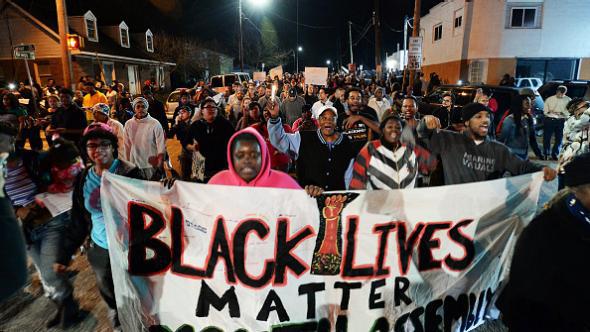In February, hundreds of protesters marched on Raleigh, North Carolina, when a police officer shot and killed a black 24-year-old named Akiel Denkins during a foot chase. On Wednesday morning, the district attorney who oversaw the investigation of the shooting announced that the officer, D.C. Twiddy, will not be charged with a crime.
The shooting occurred in broad daylight after Twiddy, who is white, moved to arrest Denkins, who was black, on an outstanding felony drug charge. At the time, people who were in the vicinity when the incident occurred told reporters that Denkins had been shot in the back. But an account provided by the Raleigh Police Department several days after the shooting said that Twiddy fired only after he and Denkins became locked in a struggle during which Denkins reached for a gun in his waistband.
In her seven-page report, which you can read in full here, Wake County District Attorney Lorrin Freeman said medical examiners concluded that one of the four bullets that struck Denkins did indeed come from behind, hitting him in the right shoulder and traveling “from back to front and right to left” before becoming lodged in his clavicle. Freeman’s report did not explain the exact circumstances under which Twiddy shot Denkins in the back of the shoulder, except to say that it occurred at close range, after Twiddy tackled Denkins to the ground and Denkins, pushing his shoulder into Twiddy, reached for a Smith & Wesson .38 that was tucked inside his waistband. The report also stated that, according to Twiddy, Denkins grabbed the barrel of his department-issued firearm after Twiddy fired his first shot.
On that basis, Freeman concluded that Twiddy’s decision to use deadly force against Denkins was an act of self-defense and “a lawful response to the situation.”
Against the backdrop of several controversial police shootings that have been caught on video in recent years, it makes sense to bring a heavy dose of skepticism to Twiddy’s account. Multiple officers in Chicago who were on the scene when Laquan McDonald was killed in 2014 said the 17-year-old had swung a knife at the officer who shot him; video footage that was released under a court order revealed that was not true. In video footage out of North Charleston, South Carolina, an officer named Michael Slager could be seen shooting 50-year-old Walter Scott in the back as he fled and then dropping a Taser at Scott’s feet.
In the case of Akiel Denkins, no video footage of the shooting ever surfaced, and the report from the district attorney seems to be written with an awareness that, in light of that fact and the recent history of such shootings, many of those reading would be unwilling to take Officer Twiddy’s account of the incident at face value. The report is heavy on physical evidence, citing gunshot residue found on Denkins’s body as proof that Twiddy shot him at close range and skin cell swabs of Twiddy’s gun that showed the presence of Denkins’ DNA.
Raleigh’s police chief, Cassandra Deck-Brown, issued a statement after the district attorney’s announcement:
The loss of a life is always profoundly regrettable, and my heart goes out to everyone affected by the death of Akiel Denkins. As the healing process continues, my goal is to work with the Raleigh community to ensure that we all do everything we can to make such occurrences as unlikely as possible.
A lawyer for the Denkins family did not respond to a request for comment on Wednesday.
